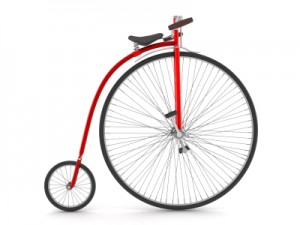I am the proud owner of a new bike. My old bike, a bargain basement no-brand, was shot. Recently I started researching a new bike in anticipation of my purchase. The choices were overwhelming. Not only was a “good” bike much more expensive than the one I purchased eight years ago, but the technologies had changed considerably.
So I did what you might expect. I began visiting bike shops and I hit the internet to read reviews and research. There are four dedicated bike-shops in Tallahassee all selling competing brands with little or no overlap in inventory. Naturally, there are also relatively inexpensive bikes for sale at the big box stores, but having already done time on an entry level bike, I was ready to move up. I was not about to make a commitment without doing my homework.

I visited each bike shop in turn, rode a lot of bikes and talked to a lot of sales people. If you have not been to a bike shop recently, you may not appreciate the dedication and expertise of the staff, but they rival the passion and expertise of the best travel consultants. Bike people know their stuff: where the bikes were made, the craftsmanship, the materials and quality. They have a working knowledge of physics, body mechanics and engineering. They understood every nuance about the bikes they represented as well as the bikes the other shops carried. These experts took product knowledge to a new level.
But here is what really impressed me. At every shop, the bulk of their questions and our conversations were about me. Each of the sales people wanted to know what kind of experience I had, where I would be riding, what my goals were, how aggressively I rode. Then, and only then, did they begin to talk about their bikes and they did so only in relation to how the bike would match with my needs.
I finally purchased my bike and I felt empowered. I had a very solid understanding of the rationale for my purchase and a compete absence of buyer’s remorse. I didn’t buy the most expensive, nor the least expensive. I bought the one that was exactly right for me, and I could not have done it without the expert assistance of the bike consultants with which I worked. These good people did not sell me a bike: they helped me to buy one.
The bike-shop paradigm is a pretty good formula for travel consultants as well. Your clients want to travel. You don’t have to sell them travel. I am fairly certain of this simple fact. If you “lose” a sale to another agency, it won’t be because the other agency knew more about Hawaii than you. It will be because the other agency knew more about the client than you did.
Product knowledge is extremely important, but only if you can relate it to your client’s needs, and the client comes first. Where has the client been in the past? How did they choose the destination? Who will they be traveling with? What hotels do they like and why? What are their hobbies? What is this particular trip about? Launching into a discussion of cruises, resorts, destinations or tours before you have an intimate knowledge of your client is a sure way to derail what could be a beautiful relationship.
Think back through the important purchases you have made as a consumer over the past couple of years. Recall and analyze why you purchased from one business rather than through another. You may discover you do business most readily with the companies who understand you as well as they understand their own products.



